|
|
|
Sort Order |
|
|
|
Items / Page
|
|
|
|
|
|
|
| Srl | Item |
| 1 |
ID:
109529
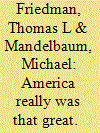

|
|
|
| 2 |
ID:
114126
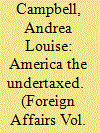

|
|
|
|
|
| Publication |
2012.
|
| Summary/Abstract |
Compared with other developed countries, the United States has very low taxes, little income redistribution, and an extraordinarily complex tax code. If it wanted to, the government could raise taxes without crippling growth or productivity. Tax reform is ultimately a political choice, not an economic one -- a statement about what sort of society Americans want.
|
|
|
|
|
|
|
|
|
|
|
|
|
|
|
|
| 3 |
ID:
082132
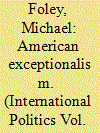

|
|
|
|
|
| Publication |
2007.
|
| Summary/Abstract |
Because American populism has traditionally been associated with indigenous themes and inward perspectives, it has never been thought to be particularly relevant to the United States' outlook upon the international order or its understanding of the generic requirements of foreign policy-making. However, recent developments surrounding the formulation and prosecution of the war on terror have cast doubts on this negative correlation. Using four thematic and analytical categories, the article reveals President Bush's close dependency upon characteristically populist principles in the way that the issue was presented to, and mediated with, the American public. It surveys the way that the Bush team employed populist narratives in advocating the need for alternative channels of international action outside both the customary agencies of collective security and the established conventions of international law. Although the usage of populist techniques was initially effective, the administration subsequently experienced some of the defects that have traditionally afflicted populism as an agency of political transformation
|
|
|
|
|
|
|
|
|
|
|
|
|
|
|
|
| 4 |
ID:
116828
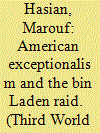

|
|
|
|
|
| Publication |
2012.
|
| Summary/Abstract |
This paper argues that Operation Neptune Spear, or the bin Laden Raid, reinforced US elite and public beliefs in American exceptionalism and the importance of carrying out numerous 'overseas contingency operations'. The combination of textual and legal rationales for the raid treated the mission as a legal and effective raid, and it could now serve as a visual model for future aggressive war fighting. This is problematic because it emboldens those who want to move away from softer, 'hearts and minds' ways of dealing with enemies, at the same time that it legitimates targeted killings and encourages violations of other nations' territorial sovereignty.
|
|
|
|
|
|
|
|
|
|
|
|
|
|
|
|
| 5 |
ID:
089259
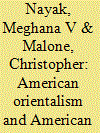

|
|
|
|
|
| Publication |
2009.
|
| Summary/Abstract |
In this essay, we argue that critical International Relations (IR) scholars must consider American Orientalism in tandem with American Exceptionalism in order to better understand US identity, foreign policymaking, and hegemony. We claim that American Exceptionalism is a particular type of American Orientalism, a style of thought about the distinctions between the "West" and the "East" that gives grounding to the foundational narrative of "America." While Exceptionalism and Orientalism both deploy similar discursive, ontological, and epistemological claims about the "West" and its non-western "Others," Exceptionalism is also rooted specifically in American political thought that developed in contradistinction to Europe. As such, we demonstrate that different logics of othering are at work between the West and the non-West, and among Western powers. We implore critical IR scholars to interrogate how the United States and Europe alternatively collude and clash in wielding normative power over their non-Western Others. We claim such research is important for exploring the staying power of American hegemony and understanding the implications of European challenges to American foreign policy, particularly given recent concerns about a so-called transatlantic divide.
|
|
|
|
|
|
|
|
|
|
|
|
|
|
|
|
| 6 |
ID:
186124
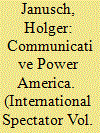

|
|
|
|
|
| Summary/Abstract |
President Trump’s credo ‘America First’ marked an end to American exceptionalism. Against this backdrop, President Biden aims to restore America’s moral leadership. Yet, he lacks a clear vision. Against the Trump doctrine and realist arguments for the end of a values-driven foreign policy, we propose a vision for a US foreign policy guided by self-restraint and critical self-reflection. We argue that following such vision is in the strategic interest of the United States. The search for a vision for a US grand strategy is not just an abstract question for International Relations scholars, but of high importance for practice. Shared visions are crucial if not necessary for successful leadership.
|
|
|
|
|
|
|
|
|
|
|
|
|
|
|
|
| 7 |
ID:
086313
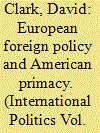

|
|
|
|
|
| Publication |
2008.
|
| Summary/Abstract |
The ideology of American primacy is not new with the Bush administration. Rather it draws upon a long tradition of American exceptionalism. Yet, the unilateralism built into this ideology is not viable as a foundation on which to build a global order, since it assumes that US behaviour is based on broadly-held values and interests, not those of a single state. With the end of the cold war many of the factors that tied the United States to Europe dissolved; moreover, the United States in effect, as its demographic and political centre moved south and west, abandoned many of the values that it shared with Europe. In many ways America's repudiation of multilateralism and welfare capitalism could be seen as a return to the default setting of its founding values. Some analysts argue that Europe faces but two alternative paths in its relationship with the United States - to accept a subservient position, while attempting to broaden Washington's agenda, or a form of 'Euro-Gaullism' in which Europe would break free from US domination. In fact, a third, and preferable approach, exists that would be based on strengthening Europe's position vis-à-vis the United States, while working with the United States in those areas where common values and interests exist. There is no doubt that a united Europe has the potential to play a more independent global role if it is willing to create the necessary decision-making structure and deploy its collective resources more efficiently.
|
|
|
|
|
|
|
|
|
|
|
|
|
|
|
|
| 8 |
ID:
187970
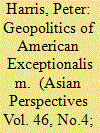

|
|
|
|
|
| Summary/Abstract |
Leaders inside the United States have long tried to maintain favorable external conditions, especially in Eurasia, to protect or advance their domestic agendas. In recent decades, this connection between domestic politics and geopolitical conditions in the “Old World” has incentivized US leaders to pursue a pattern of never-ending military interventions. In turn, the material reality of perpetual engagement in Eurasian affairs has given rise to the pervasive idea that the United States is and must remain an indispensable guarantor of international order. However, these contemporary ideas of American Exceptionalism are dangerously mismatched with the emerging reality of a multipolar world system in which the United States has fewer opportunities to militarily intervene across Eurasia without risking significant repercussions.
|
|
|
|
|
|
|
|
|
|
|
|
|
|
|
|
| 9 |
ID:
141198


|
|
|
|
|
| Summary/Abstract |
Videogames matter and they matter for international politics. With popular culture increasingly acknowledged as a valuable site for opening up new ways of interrogating theory, this article argues that important insights for the critical understanding of American exceptionalism can be developed through the study of military videogames. At one level, military videogames illustrate a number of prominent themes within American exceptionalism: they offer the perception that a threatening and hostile environment confronts the USA, thus situating America as an innocent victim, justified in using force in response; they allow exploration of the link between American exceptionalism and debates on the competence of political leadership, and they open up space to analyse the temporal dimension of international relations. Yet videogames also help expose the foundations (what Weber terms ‘the myths’) upon which American exceptionalism is based, here shown to be centred on the importance of the military industrial complex as a source of exceptionalism.
|
|
|
|
|
|
|
|
|
|
|
|
|
|
|
|
| 10 |
ID:
170879


|
|
|
| 11 |
ID:
138979
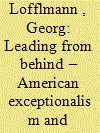

|
|
|
|
|
| Summary/Abstract |
This article explores the discursive performance and political significance of ‘American exceptionalism’ under President Obama. Moving beyond a critical examination of geopolitical identity, it investigates how representations of exceptionalism, understood as ideational construct of uniqueness and superiority, are linked to practices of US foreign and security policy that confirm, but also contest, established notions of American leadership in world politics. A particular focus lies on the 2012 presidential campaign, and how diverging ‘exceptionalist’ visions between Obama and Mitt Romney testified to competing ideas for American primacy and cooperative engagement. The article will further examine the cases of ‘leading from behind’ in Libya, American non-intervention against Assad in Syria, and US reactions to current crises concerning Ukraine and ISIS. The contextualisation of these episodes in contemporary, geopolitical discourse reveals how the practice of US foreign and security policy under Obama is shaped by a conflicted and paradoxical vision of post-American hegemony.
|
|
|
|
|
|
|
|
|
|
|
|
|
|
|
|
| 12 |
ID:
165063
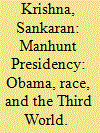

|
|
|
|
|
| Summary/Abstract |
President Obama’s commitment to a creedal narrative of American exceptionalism and his understanding of the Third World as a space of ontological deficit together made for a presidency that could neither mitigate the structural racism of the United States nor deflect a racist foreign policy premised on an unending war against terror. By examining the murders of two American teenagers – Trayvon Martin and Abdulrahman Al-Awlaki – this essay argues that the very self-fashioning narratives that propelled Obama to the presidency of the United States rendered him incapable of effecting any substantive changes in the racism than animates its domestic and foreign policies.
|
|
|
|
|
|
|
|
|
|
|
|
|
|
|
|
| 13 |
ID:
109528
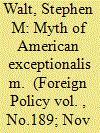

|
|
|
| 14 |
ID:
155589
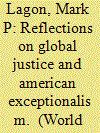

|
|
|
|
|
| Summary/Abstract |
American exceptionalism is a double-edged sword, often taking the form of a cultural predisposition to promote universal values to the world, but also taking a form of exempting the United States from scrutiny regarding living by those values itself. As 46.1 percent of the American public voted for the latter version of American exceptionalism in 2016, this essay examines several areas of that self-exemption, including treaties the United States fails to sign or ratify, trade policies, trafficking in persons policy, torture in counterterrorism policy, targeting Muslims indiscriminately in drone strikes and screening refugees, transparency lacking in campaign finance, trust in institutions, and the style of populism emergent in the 2016 election. There are prospects for renewal when such a gap emerges between ideas and institutions, based on earlier cycles in American history. U.S. legitimacy as a powerful catalyst for a world order favoring human dignity depends on being an exemplar.
|
|
|
|
|
|
|
|
|
|
|
|
|
|
|
|
|
|
|
|
|